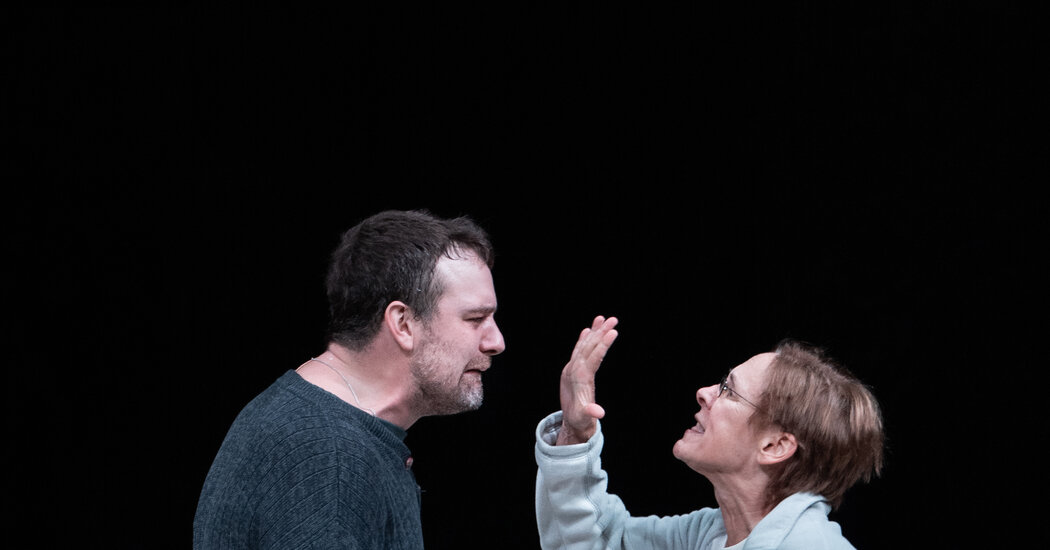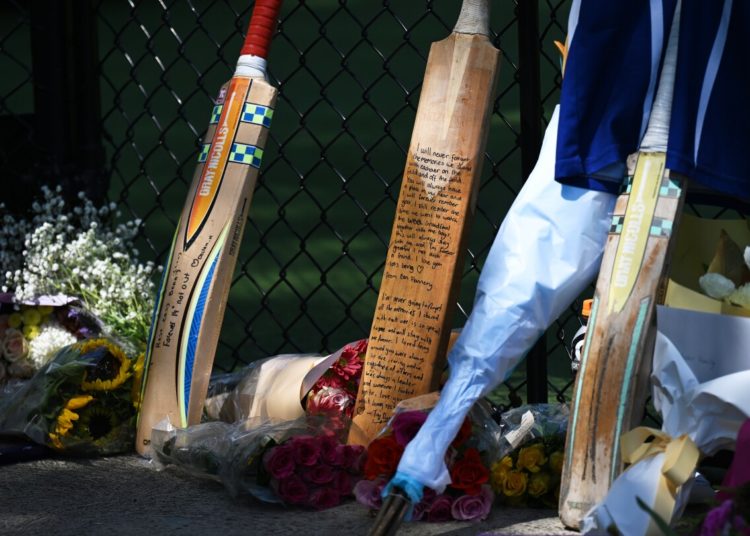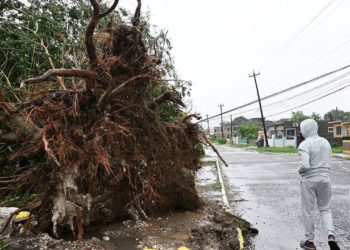Out past the edge of town, on her dozen acres of northern Idaho, Sarah Fernsby is doing just fine on her own, and don’t you dare suggest otherwise. She has a rifle for protection, though her manner alone could scare off anyone. She drives a truck so hulking that if she hits a large animal, it barely affects the ride.
Bulldozer aggressive, with a tripwire temper and a tendency to shout, she is seemingly unacquainted with the notion of emotional regulation. As played by a glorious Laurie Metcalf in Samuel D. Hunter’s keen-eyed, compassionate play “Little Bear Ridge Road,” which opened on Thursday night at the Booth Theater, she is also one of the funniest and most thoroughly human characters seen lately on a New York stage.
One of the most entertaining, too, despite the fact that Sarah’s habitat is entirely domestic and almost defiantly unglamorous. She lives a small life, not amped with exciting incident, unless you count the whipsaw changes to her mood. But as she says of the overwrought dramas that she flips past on TV: “Real people aren’t always desperately doing things.”
Hunter, a prolific Off Broadway playwright with an oeuvre of works set in Idaho (“A Case for the Existence of God,” “Grangeville”), is making his Broadway debut with “Little Bear Ridge Road,” which had its premiere last year at Steppenwolf Theater Company in Chicago. Its transfer declares the Broadway resurrection of the exiled-for-a-while producer Scott Rudin. (Allegations of bullying in 2021 led to widespread denunciations.) And honestly? Everything about this impeccable production, presented by Rudin and the media mogul Barry Diller, exudes the nearly flawless taste that Rudin is famous for.
A play about the poisonous effects of social disconnection and the double-edged ideal of self-reliance, “Little Bear Ridge Road” begins amid the Covid-19 pandemic, while the world is shut down. Sarah isn’t looking for company, but it shows up on her doorstep anyway in the form of Ethan (Micah Stock), the nephew she hasn’t seen in years. Wearing a pale blue face mask and keeping a cautious distance, he is back from Seattle to sell his dead father’s — her dead brother’s — house.
They are the last of the Fernsbys, these two: mistrustful loners, and sardonic as can be. Sarah, who possesses an underused capacity for kindness, is a nurse with nearly 40 years of experience and no compunction about making her colleagues cry. Ethan is a fiction writer, or means to be; he has an M.F.A. but is creatively adrift. He resents having to think at all about his father, whose addiction to meth (a rural American plague) endangered his childhood, and who last got in touch to ask for money.
When Sarah invites Ethan to stay with her, they unknowingly embark on the sort of long-term familial intimacy that each of these psychologically well-armored people has kept diligently at bay.
“You’ll have to be patient with me,” she warns gruffly, out of practice at sharing space, but the caveat mutually applies. Gradually, as he lingers through the pandemic and its aftermath, they tame each other — this man who is not mourning his father, and this woman who couldn’t save her brother and didn’t save his child.
To a degree that’s almost startling, Joe Mantello’s production and its across-the-board excellent cast recapture the feeling of those strange, anxious, early days of Covid. The script says the play takes place on “a couch in a void,” and that is what we see: a bulky, beige recliner couch, anchored on a disc of sand-colored carpeting.
In the initial scenes, the stage around that starkly delineated circle remains in impenetrable darkness, because that’s how cut off we were from one another back then. (The set is by Scott Pask, lighting by Heather Gilbert.) The pandemic is this play’s psychic landscape, a means of examining isolation in American culture — but also of recording in the dramatic literature some particulars of that time.
Will audiences of the future understand why Ethan wears a mask in 2020, why he doesn’t come near his aunt at first, why his father died alone in the hospital? (“They still aren’t allowing visitors,” Sarah says.) Will they get why, when Ethan meets a graduate student named James (John Drea) the next year for a hookup, it’s weird for both of them to be in a bar again, and why Ethan catches himself when he reflexively shakes James’s hand?
As the world reopens, the play’s aperture widens to give us a sense of the cosmic — partly courtesy of James, who is studying astrophysics and becomes more than a hookup, and partly courtesy of Pask’s magnificently rough-textured upstage wall, which we can now see in all its abstract majesty, imbuing the play’s world with the vastness of nature.
The characters relax their boundaries, too. Sarah and Ethan close much of the distance between them, while gentle James — who grew up with money and without trauma, and does not flee at the prospect of love — tiptoes closer to Ethan’s heart.
But of course there are reasons that love is scary, like the prospect of needing someone, or losing them. No spoilers, but the U.S. health care system takes some hits. So does societal erosion.
Just off the phone about a medical bill, a frustrated Ethan erupts: “I hate this country!”
Sarah reassures him dryly: “Trust me, it hates you more.”
Metcalf, ripping into her role throughout, holds firm against sentimentality. Hunter, though, is a tiny bit tempted in the other direction, as he was in “The Whale,” another Idaho play, which made his name over a dozen years ago.
The ending of “Little Bear Ridge Road” contains echoes of “The Whale” in something that a character asks for (again, no spoilers), and in spelling out the meaning of the work. The elucidation feels unnecessary, yet it also makes sense within the context of the play.
On that couch in the void, shortly after Ethan arrives in 2020, he starts watching a TV series. Sarah soon joins him, hoping to find something they can talk about — two awkward people, side by side. They tune in regularly each season, and by the time the series concludes, James is following it with them, too.
But after all the hours they’ve invested, the finale is a cop-out.
“That was terrible,” Ethan says, genuinely outraged. “That was the single worst episode of television I have ever seen.”
“Little Bear Ridge Road” asks of its audience a mere 95 minutes, straight through. And if Hunter wraps things up neatly at the end, that’s the kind of story he decided to tell. Unlike some maddening TV show, he is not about to leave you dissatisfied.
Little Bear Ridge Road
Through Feb. 15 at the Booth Theater, Manhattan; littlebearridgeroad.com. Running time: 1 hour 35 minutes.
The post Laurie Metcalf Is Riveting in ‘Little Bear Ridge Road’ appeared first on New York Times.




